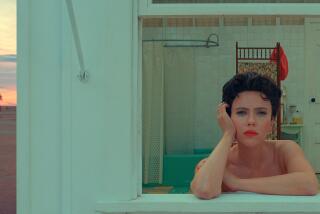MOVIE REVIEW : ‘Twentieth Century’: Enyedi’s Valentine
- Share via
No wonder “My Twentieth Century” (at the Royal) took the Camera d’Or at Cannes, for it is a vaultingly ambitious, quirkily original and witty debut feature by Hungarian filmmaker Ildiko Enyedi, who attempts no less than a consideration of what the 20th Century has meant for society as a whole and women in particular.
Yet to watch “My Twentieth Century,” for all its underlying seriousness, is to recall fond memories of beloved grandparents (or great-grandparents) telling us what it was like to experience the parade of one seemingly miraculous invention after another, from electricity to TV.
By evoking the global wonderment that greeted the arrival of the electric light and simultaneously spinning the most outrageous tale of two sisters, Enyedi and her versatile cameraman, Tibor Mathe, create a tantalizing gossamer fable in the gorgeously lit style of the early black-and-white silents while lamenting how we failed to fulfill the liberating promise of late 19th-Century technology and how women have been confused throughout this century as to what role they should play in modern society.
Just as Thomas Edison (the distinguished stage and screen veteran Peter Andorai) is switching on the world’s first string of outdoor Christmas tree lights in Menlo Park, N.J.--the year is 1880--a poor Hungarian woman is giving birth to identical twin girls, who are abruptly separated at about age 10. Enyedi sketches in their melodramatic childhood with vignettes referring affectionately--iris shots and all--to D.W. Griffith and the Gish sisters and to Jean Renoir’s “Little Match Girl.”
Now it’s 1900 and the two sisters, Dora and Lili, played by the ravishing, effervescent Dorotha Segda, are both aboard the Orient Express. Soon they will meet, not each other, but a tall, lean mystery man (Oleg Jankowski) who does not realize they are not the same woman. What Enyedi suggests, however, is that symbolically they in fact are. While Lili has become an idealistic revolutionary, Dora has remained the eternal temptress, an expensive, cynical courtesan. (Her seduction of Jankowski is further evidence that women are the cinema’s supreme eroticists.)
Together, they represent the duality of the modern woman faced with trying to be a figure of sexual allure yet sharing equal status with men in running the world. In resolving this conflict, Enyedi, whose entire film is a homage to the motion picture as the most potent of the 19th-Century inventions, borrows dazzlingly from the famous fun-house mirror sequence in Orson Welles’ “Lady From Shanghai.”
For all her freewheeling imaginativeness, so reminiscent of the pastiches of the early Godard and Truffaut, Enyedi does not always sustain interest in her various digressions. For example, a lecture by a stern professorial male on the “inferiority” of women threatens to become interminable. Despite such occasional minor lapses, “My Twentieth Century” (Times-rated Mature for sex, complex style and themes) remains on the whole buoyant and beguiling--and is surely among the most distinctive films to arrive this year.
More to Read
Only good movies
Get the Indie Focus newsletter, Mark Olsen's weekly guide to the world of cinema.
You may occasionally receive promotional content from the Los Angeles Times.










